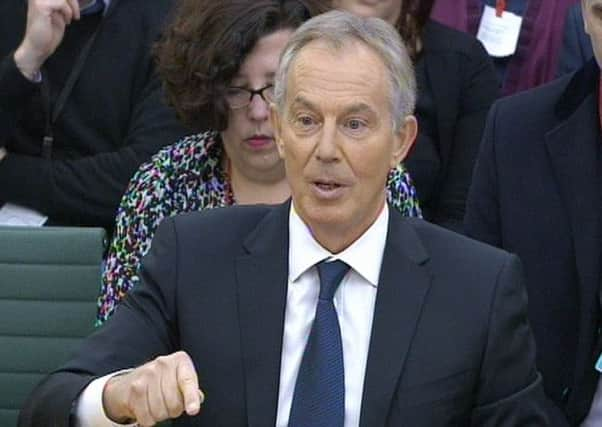‘On the runs’ letters key to Peace Process - Blair


However, Mr Blair refused to apologise for the process of sending letters of “comfort” to so-called “on the runs” (OTR), advising them they were not wanted by the authorities, because he said it was “integral” to bringing peace in Northern Ireland.
CONNECT WITH THE SCOTSMAN
• Subscribe to our daily newsletter (requires registration) and get the latest news, sport and business headlines delivered to your inbox every morning
Advertisement
Hide AdAdvertisement
Hide AdThe dramatic apology came with Mr Blair turning around to the families of victims on the urging of DUP MP Ian Paisley Jr as they watched his evidence to the Northern Ireland select committee during its inquiry into the “on the runs” scheme.
Mr Blair insisted, though, that he did not know of the letter to Mr Downey until his trial was ended at the Old Bailey last year because of the reassurances that the government had given him.
Mr Blair said it was “a catastrophic mistake” for it to have been sent when concerns were being raised about the practice.
He said: “I should accept full responsibility for everything that happens in a government of which I am the Prime Minister. I take full responsibility for not having put in place a structure for this procedure that might have meant, in the Downey case, that the letter would not have been sent and therefore the trial would have proceeded.
“So for that I take responsibility and I feel sorry for those people and I apologise to those people who have suffered as a result of that.” However, he added: “I am not going to apologise for sending those letters to those who should have received those letters because without having done that, we would not have a Northern Ireland peace process in place today.”
Despite constant probing from MPs, Mr Blair insisted the letters to OTRs were not a secret, although he accepted that individual letters were confidential.
And in an often uncomfortable session, the former Labour Prime Minister was accused by Mr Paisley of being “too close” to Sinn Fein leaders Gerry Adam and Martin McGuinness.
However, Mr Blair insisted there were no more “secret deals” with Sinn Fein. He said he felt “repugnance” for releasing convicted terrorists but it was necessary to get peace.
Advertisement
Hide AdAdvertisement
Hide AdHe told the committee that throughout the talks, the peace process was “on a knife edge” and he told his then chief of staff Jonathan Powell: “I thought we were going to lose this thing.”
Mr Blair said he understood the anxiety about compromises but it was important to end terrorism. The scheme for fugitive IRA members was “vital” to keeping Northern Ireland’s fragile peace process on track. His Labour administration sent about 200 letters to republicans, assuring them they were not being pursued by the UK authorities.
The scheme was drawn up following pressure from Sinn Fein to allow the fugitives who, had they been in prison before 1998, would have been released under the Good Friday Agreement, to return to Northern Ireland.
An investigation was launched by MPs when the prosecution of Mr Downey for the murder of four soldiers in the Hyde Park bombing in 1982 was halted after he received one of the OTR letters in error.
The former premier told the committee at Westminster that the scheme evolved over time. “It was not an amnesty, it was not secret, but it nevertheless dealt with one part of the problem we had to deal with,” he said.
The committee launched its investigation after Mr Downey was released last year when a judge halted his prosecution for the bombing. The committee is due to complete its report soon.
Household Cavalry Lieutenant Anthony Daly, 23, died in the blast alongside Trooper Simon Tipper, 19, Lance Corporal Jeffrey Young, 19, and Squadron Quartermaster Corporal Roy Bright, 36.
SCOTSMAN TABLET AND IPHONE APPS